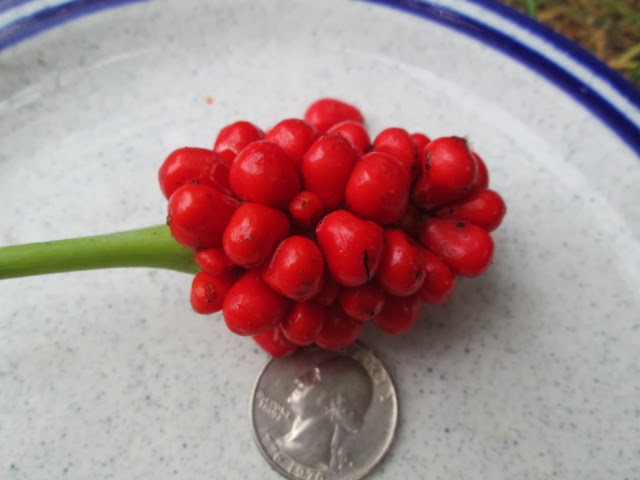 |
| Arisaema triphyllum - Jack-in-the-pulpit seed |
An Army of Jacks Plus One!
Propagating Arisaema triphyllum
Last year was an exciting year! I raised enough Jack-in the Pulpit seed that purchasing commercially grown seed wasn't necessary. I must warn you that raising Arisaema triphyllum for seed is a slow process, four years to be exact. If you are pressed for time then by all means purchase a mature plant. Actually you will need two, both a male and female.
On the other hand if you are up for a challenge, and are interested in raising woodland plants from seed then, Jack-in the Pulpits are a good place to start.
Harvesting Mature Seed
September, 2013
 |
| Pot where Jack-in- the- Pulpit resided |
The bright crimson colored seed of Jack-in-the-pulpit is a dead give-away harvest time is approaching.
Having learned a valuable lesson last spring on the importance of protecting other woodland seed from hungry garden predictors, I was determined to guard my seed even if it meant proceeding with the intensity of Wiley Coyote, tracking down the Road Runner.
Conveniently, the plant which was flowering was growing in a pot, allowing for a much easier defense of my precious bounty.
Defense Strategy
- First Line - Move pot to higher ground
- Second Line - Secure borders with fencing
- Third Line - For good measure cloak seed with a onion bag veil
So Who or What Devours the Seed?
Curiosity got the best of me. Who or what was I actually protecting my seed from? I was surprised to learn that due to calcium oxalate levels in the fruit, leaves and corms Jack-in the-Pulpit was not a popular delicacy with most mammals. Evidently, quail, turkey and pheasant appreciate the seed; however, typically game birds don't reside in suburban backyards. If this is the case, then perhaps my extreme protective measures were in vain.
Cleaning and Storing Your Seed
Once you have collected the seed, the process of cleaning it and storing it may begin. Arisaema species are considered hydrophilic, meaning it is important to not allow seed to dry out. Preparing and cleaning seed for storage requires a few simple steps.
 |
| Jack-in-the- Pulpit seeds soaking |
- First - Soak seed in water for 10 minutes or until the red skin slides off easily. It is is advisable to wear gloves cleaning these seeds as calcium oxalate is a skin irritant.
 | ||||
| Slimy jack-in-the-pulpit seed |
- Second - Remove the red skin, it slides right off. Skin is on the left seed on the right.
 |
| Arisaema triphyllum seed ready for cold, moist storage |
- Third - Seed is now ready for cold, moist storage - Small plastic bags with a 1/4 cup of vermiculite, stored for 30 days in the refrigerator unlocks dormancy.
 |
| Stalk stripped to the bone! |
Planting Your Seed
October, 2013
 |
| Seedling leaf |
Jack-in-the-pulpits have interesting growth pattern. During the first year they are merely a tiny little stalk with one sole heart shaped leaf. Don't panic when they peter out after 3 months or so, that is their life cycle.
Once they begin to wither, either put the entire pot in a cold location for two or three months or remove individual corms from the potting soil and once again store them in a cold, moist environment, my preference the refrigerator.
Army of Jacks Plus One!
February 2014
 |
| A few of my Jack-in-the-pulpit seedlings |
The germination rate from this seed was exceptional! I currently have an Army of Jacks (65 to be exact) "Plus One" growing in our window sill. "Plus One" you ask? I suspect my mystery guest is a member of the squash family, whose seed was deposited by a mouse hoarding its winters stash.
Perhaps, I should have been more concerned with protecting my soil than my seed. Either way "Plus One" continues to reside contently among the Jacks!
Plus One - Possibly a Pumpkin!
 |
| My guess a pumpkin growing with the Jack-in- the Puplits |
If you are looking for seed, I am familiar with two commercial growers: Everwild Farms, and Prairie Moon Nursery. Although a bit pricy, purchasing Jack-in-the-pulpits seed is a great way to get started growing woodland wildflowers. Why bother you might ask? That is simple... it is fun!
Visit our website for more information on Jack-in-the-pulpits.

Such a great plant! I have been collecting and sowing the seed for a couple years now and am starting to get a small, but expanding, population. It's a little bit more labor intensive growing these, but well worth it since they are one of the best native plants for shade.
ReplyDeleteI agree! For some reason raising Jack-in- the-pulpits is very rewarding. I am work on Green Dragons. Have you tried them yet? At this point I only have two seedlings, I am considering order more.
ReplyDeleteThanks..
ReplyDeleteYou are welcome!
Delete